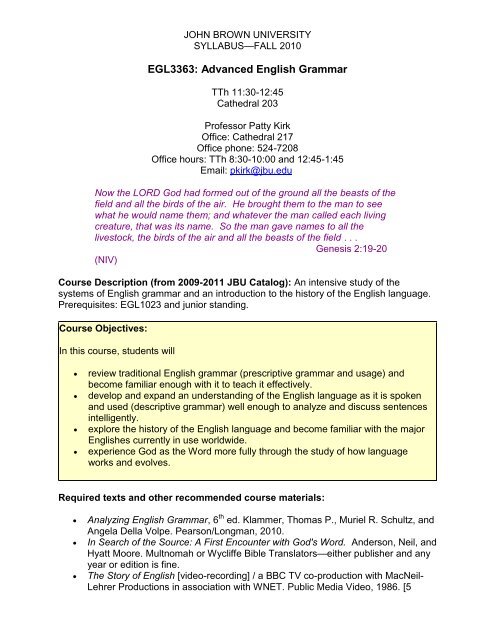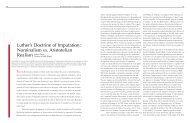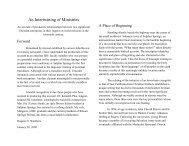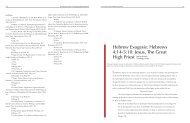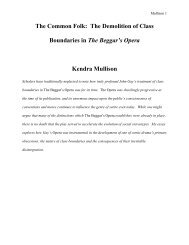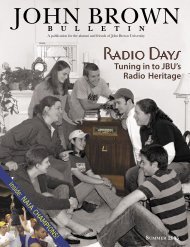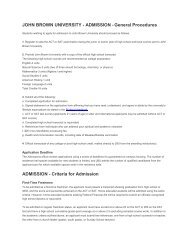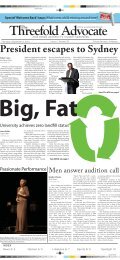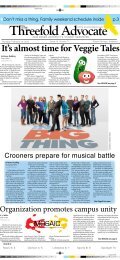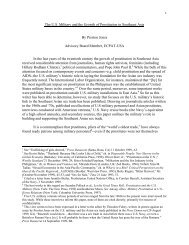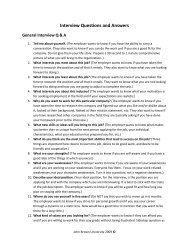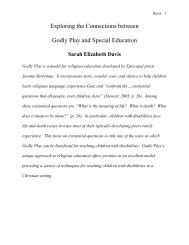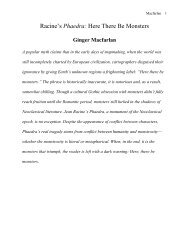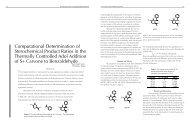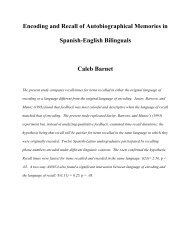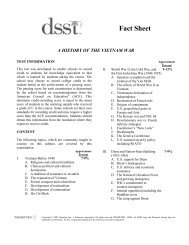EGL3363: Advanced English Grammar - John Brown University
EGL3363: Advanced English Grammar - John Brown University
EGL3363: Advanced English Grammar - John Brown University
Create successful ePaper yourself
Turn your PDF publications into a flip-book with our unique Google optimized e-Paper software.
JOHN BROWN UNIVERSITY<br />
SYLLABUS—FALL 2010<br />
<strong>EGL3363</strong>: <strong>Advanced</strong> <strong>English</strong> <strong>Grammar</strong><br />
TTh 11:30-12:45<br />
Cathedral 203<br />
Professor Patty Kirk<br />
Office: Cathedral 217<br />
Office phone: 524-7208<br />
Office hours: TTh 8:30-10:00 and 12:45-1:45<br />
Email: pkirk@jbu.edu<br />
Now the LORD God had formed out of the ground all the beasts of the<br />
field and all the birds of the air. He brought them to the man to see<br />
what he would name them; and whatever the man called each living<br />
creature, that was its name. So the man gave names to all the<br />
livestock, the birds of the air and all the beasts of the field . . .<br />
Genesis 2:19-20<br />
(NIV)<br />
Course Description (from 2009-2011 JBU Catalog): An intensive study of the<br />
systems of <strong>English</strong> grammar and an introduction to the history of the <strong>English</strong> language.<br />
Prerequisites: EGL1023 and junior standing.<br />
Course Objectives:<br />
In this course, students will<br />
review traditional <strong>English</strong> grammar (prescriptive grammar and usage) and<br />
become familiar enough with it to teach it effectively.<br />
develop and expand an understanding of the <strong>English</strong> language as it is spoken<br />
and used (descriptive grammar) well enough to analyze and discuss sentences<br />
intelligently.<br />
explore the history of the <strong>English</strong> language and become familiar with the major<br />
<strong>English</strong>es currently in use worldwide.<br />
experience God as the Word more fully through the study of how language<br />
works and evolves.<br />
Required texts and other recommended course materials:<br />
Analyzing <strong>English</strong> <strong>Grammar</strong>, 6 th ed. Klammer, Thomas P., Muriel R. Schultz, and<br />
Angela Della Volpe. Pearson/Longman, 2010.<br />
In Search of the Source: A First Encounter with God's Word. Anderson, Neil, and<br />
Hyatt Moore. Multnomah or Wycliffe Bible Translators—either publisher and any<br />
year or edition is fine.<br />
The Story of <strong>English</strong> [video-recording] / a BBC TV co-production with MacNeil-<br />
Lehrer Productions in association with WNET. Public Media Video, 1986. [5
videos comprising 9 segments, approximately 1 hour long each, on reserve in the<br />
library, where it may be viewed singly or in groups.]<br />
Half a package of 4X6, ruled, index cards in five different colors. (The bookstore<br />
carries them. You may share a package with a partner.)<br />
http://grammar.ccc.commnet.edu/grammar. We won't have time to use this<br />
excellent website in class, but I recommend it for review or remediation of basic<br />
grammar skills that you should have been taught in junior high and high school<br />
but may have forgotten (or ignored, missed due to illness, actively rejected,<br />
etc.). The website is well organized and easy to get around in, has interactive<br />
self-graded quizzes, and is useful at all levels of proficiency. Best of all, it’s<br />
entertaining. For the grammar-timid, I would recommend going through the<br />
grammar sections tutorial by tutorial until you begin to feel more confident. Use<br />
it! Attention virgin diagrammers: Under the drop down menu entitled "Word &<br />
Sentence Level" you will find an excellent diagramming tutorial.<br />
Grading policy: I will assess the students’ progress in the course objectives on the<br />
basis of seven grades of equal value:<br />
four tests (the last of the four is the final examination)<br />
o If, on any of your examinations, you believe that the answer you gave would<br />
also be correct (which is entirely possible, as you will be discovering), you<br />
may defend your correct answer in writing for possible credit.<br />
a number of smaller assignments such as reading quizzes and homework<br />
assignments that, averaged together, will constitute a daily effort grade<br />
two written In Search of the Source assignments, averaged together to form one<br />
grade<br />
nine written The Story of <strong>English</strong> assignments, which, averaged together, will<br />
form one grade<br />
All of the specifications for any of the assignments must be followed for an optimal<br />
grade. For written assignments, use Standard Edited American <strong>English</strong> and MLA<br />
format, unless otherwise specified. All tests and assignments are graded as<br />
percentages of 100, and my grading scale for the class is:<br />
90 - 100% = A<br />
80 - 89% = B<br />
70 - 79% = C<br />
60 - 69% = D<br />
0 - 59% = F<br />
Attendance policy: I will take attendance at the beginning of each class and mark any<br />
students not present at that time absent, even if they arrive late. In accordance with the<br />
JBU attendance policy (see catalog), each student is permitted 2 excused absences for<br />
this TTh course, to be used for whatever you like. (Attending a relative or friend's<br />
marriage is an especially good use of an unexcused absence.) Each unexcused<br />
absence beyond the two allowed will lower the student’s final grade by 1.5 points, and<br />
students who are absent for half or more of the class meetings will fail, whether their<br />
absences are excused or unexcused. Work missed because of an unexcused absence<br />
may not be made up.
I will excuse absences due to circumstances described on pages 59-61 of the JBU<br />
2009-2011 catalog. Soliciting my excuse or make up work for any excused absence is<br />
the student’s responsibility and must be arranged at the earliest opportunity after an<br />
excused absence. Visit with me about excusing an absence or credit for work missed as<br />
soon as you return following an unforeseen excused absence. I will not entertain such<br />
discussions, excuse past absences, or give credit for work missed after a student has<br />
been back in class longer than one week following an absence.<br />
Athletes and others who anticipate repeated excused absences: Absences excused due<br />
to JBU-sponsored activities are now posted on an official website available to faculty, so<br />
it is not necessary to provide documentation for those, but doremind me about them in<br />
advance of the class you will miss and make plans for how you will deal with late work.<br />
Late work: All course assignments are due at the beginning of class on the due date<br />
unless otherwise specified in the syllabus. If, for any reason, you can't get one of the<br />
written assignments in on time, don't email or phone or even explain to me the reason<br />
why, but just hand it in in class as soon as you get it done. I will lower the grade you<br />
would have gotten had you handed it in on time by 10% per classday late, beginning<br />
with the due date itself, since anything not handed in at the start of class is considered<br />
late. The only exceptions are the electronically submitted assignments (statement of<br />
commitment, grammar devotional, etc.), for which I will take off 10% for each day late<br />
past midnight on the due date.<br />
What to bring to class: The book, any homework or required materials for that day as<br />
listed in the daily schedule below, your index cards, a notebook, and any questions or<br />
problem sentences you may have come up with since the last class.<br />
Special assignments:<br />
Statement of commitment to this course: On the faculty information page of the<br />
Blackboard for this course, you will find my statement of commitment to you and this<br />
course. Please email me your own statement of commitment by the drop deadline,<br />
Friday, 22 October. Please be candid but also serious about this assignment: Reflect on<br />
what you want to get out of the course and what you intend to invest―behaviorally,<br />
emotionally, spiritually―to get the outcomes you desire. Even though you are<br />
submitting the assignment via email, please use complete words and sentences and<br />
standard capitalization and punctuation, and be sure to spellcheck before you hit<br />
send―just as you would with any communication you take seriously. Worth one daily<br />
effort grade.<br />
Index cards: You may use index cards to construct an easily accessible taxonomy of<br />
the parts of speech and structure words that you can use on tests. The cards must be 4<br />
X 6 and in four different colors, and I will let you know how many you may have for each<br />
test. Most brands have 100 cards in a package of 5 assorted colors. I will not allow any<br />
other size cards or colored paper cut to size to be used on the tests. I have ordered<br />
these cards in the bookstore. If they run out, they have promised me that they will get<br />
more. They are available at most office supply stores as well. This is not a graded<br />
assignment, merely a recommended one, designed to benefit you.
Quizzes: Expect a quiz for any assigned reading. My goal on these quizzes is to<br />
ensure that you come to class prepared to learn new material. To prepare for quizzes:<br />
Take notes as you read.<br />
Keep a list of all new vocabulary and learn it. <strong>Grammar</strong> vocabulary can be<br />
daunting. In learning new vocabulary, give some thought to why a word or term<br />
might have the name it has―how is the same or a similar word used in ordinary<br />
<strong>English</strong>? What I have found helps most in learning new words is to actually use<br />
them―or, as I like to call it, to incarnate them: feel them in the muscles of your<br />
tongue and fingers, make them an actual part of your flesh.<br />
Attempt to organize what you read into a framework that means something to<br />
you.<br />
Use the many study aids included in the textbook, such as chapter previews and<br />
reviews, the use of bold for new words within chapters, and the glossary at the<br />
back. See the book's preface for an overview of what all's available.<br />
Do the exercises in the text. I will put the answer key on reserve for this class in<br />
the Library.<br />
The Story of <strong>English</strong>: View the nine video segments on reserve in the library and<br />
submit your responses to each of the segments on the due dates in the syllabus. I<br />
grade these assignments very carefully and care a lot whether you follow my<br />
specifications. For this reason, I will go over the assignments in class and provide<br />
rubrics covering mechanical details and even a template for the format of this<br />
assignment. If you want to get good grades on these reports, be careful to give me<br />
exactly what I am looking for.<br />
You must watch the videos in the library viewing room, but you may do so whenever<br />
you want, by yourself, or in a group with others. You can even make a party of it by<br />
dragging in the more comfortable chairs from outside the viewing room and having<br />
popcorn or some other snack and drinks (in covered containers only) while you watch. (I<br />
have checked this out with the Library Director, in case anyone objects. Do, however,<br />
be scrupulous in cleaning up after yourselves and returning moved furniture to wherever<br />
you got it from.)<br />
In Search of the Source: Reading quizzes plus two written assignments. Submit<br />
assignments on the due dates in syllabus.<br />
Note: It is up to you to remember these special assignments. Due dates are in the<br />
schedule below.<br />
How to prepare for examinations and do well in the class:<br />
Take notes in class and use what you learn each day to update and add to your<br />
index cards, which you are allowed to use on tests.<br />
Use the textbook's excellent study aids, such as chapter goals and summary text<br />
boxes, to organize your reading and help you take useful notes.<br />
Do the exercises in the book. I do not assign many of these, but I recommend<br />
that you do them all, especially if you are struggling. I will put the answer booklet<br />
on reserve in the library.<br />
Practice diagramming with others in the class. Start a recreational diagramming<br />
group. Use the diagramming tutorial linked above under recommended reading.
Whenever you don’t understand a concept, ask questions.<br />
Request tutoring and attend test review sessions with the course grammar tutor<br />
(to be arranged).<br />
Review assigned reading, exercises, and notes of in-class discussion before a<br />
test. You might want to form a study group with others for this purpose.<br />
Reread the summary of each chapter before a test, complete the review<br />
exercises, and check your answers in the answer booklet on reserve.<br />
Some things you will know by the end of the semester: (This is just a taste.)<br />
the general history of the <strong>English</strong> language<br />
how to identify the form and function of all parts of a sentence<br />
how to answer grammatical questions others might put to you<br />
how to test and defend grammatical hypotheses<br />
how to diagram sentences<br />
Some of the various ways I may assess your knowledge of new and prerequisite<br />
concepts (i.e., what will be on tests):<br />
systematically analyze the morphology of a word<br />
identify that in a sentence as either demonstrative pronoun, demonstrative<br />
adjective, relative pronoun, complementizer, or part of a phrasal subordinating<br />
conjunction<br />
punctuate restrictive/non restrictive modifiers in sentences<br />
choose who vs. whom in sentences [that is, sorting out how what is functioning<br />
within a clause]<br />
diagram sentences<br />
box and label main constituents of complex sentences and their clauses and<br />
phrases<br />
The purpose of the various assessment methods:<br />
systematically analyzing the morphology of a word: helps you understand how<br />
the <strong>English</strong> language works<br />
identifying that in sentences: demonstrating that you can differentiate between<br />
clause types and thus know how each functions and also that you really<br />
understand clauses<br />
punctuating sentences: applying a grammatical concept to your usage decisions<br />
choosing between who and whom: differentiating between spoken and written<br />
<strong>English</strong>, testing hypotheses about language<br />
diagramming sentences: figuring out how what is functioning in a sentence<br />
boxing and labeling phrasal and clausal sentence components: same as<br />
diagramming plus demonstrating ability to break sentences into their constituent<br />
parts<br />
Final Exam Policy<br />
Students must sit for the final exam at the specified time. The only exceptions are death<br />
or serious illness of a member of the student's immediate family or illness of the student<br />
as documented by a medical professional. Any exception to the final exam policy must<br />
be approved by Becky Lambert, the Associate Dean of Academic Services.
Policy on Students with Disabilities<br />
Students with documented disabilities who need academic accommodations should<br />
make an appointment with the Director of Student Support Services (238-8770) to begin<br />
the accommodation process. They are also encouraged to make an appointment with<br />
the instructor as soon as possible. Students without documented disabilities who feel<br />
they may have difficulty with this course are also encouraged to make an appointment<br />
with the instructor to discuss what steps need to be taken to be successful.<br />
Course Tutor<br />
Sarah Nealeigh, a successful previous student of the class, is available at no cost to<br />
tutor students individually and in groups. She will visit our first class session and give<br />
you her contact information. Please contact her if you find yourself struggling and be<br />
sure to attend the group study sessions she will set up before each test.<br />
Statement on Academic Integrity<br />
As a Christian institution of higher education, <strong>John</strong> <strong>Brown</strong> <strong>University</strong> seeks to maintain<br />
the highest standards of academic integrity. Violations of these standards will result in<br />
substantial penalties. At a minimum, any instance of cheating or plagiarism will result in<br />
a zero for the assignment and a report submitted to the academic dean. Further<br />
infractions will result in failure of the course and possible suspension. For additional<br />
information and examples, refer to the Academic Integrity section on pages 4-5 of your<br />
Student Handbook.<br />
Fall Break (October 18-19) and Thanksgiving Break (November 24-26)<br />
Friday, October 15, and Monday and Tuesday, November 22-23 are regular class days.<br />
Students should not make travel plans for these dates.<br />
Statement on Academic Expectations<br />
<strong>John</strong> <strong>Brown</strong> <strong>University</strong> is a selective academic institution that consistently ranks among<br />
the top southern baccalaureate universities in the U.S. News and World Reports college<br />
rankings. As a student here, you are expected to devote significant time and effort to<br />
your academic courses. This course has been designed with the expectation that<br />
students will spend, on average, approximately 2 hours preparing for each class<br />
session. Furthermore, an “A” grade in this course signifies exceptional achievement,<br />
not merely completion of assignments.<br />
Concerning fairness, lack of enthusiasm, stress, despair, related issues, and<br />
urgent unrelated issues<br />
In my years teaching this course, I have found that some students who “thought they<br />
knew” grammar or were accustomed to getting straight As end up struggling in<br />
<strong>Advanced</strong> <strong>Grammar</strong>. Such struggling students—out of shock, denial, and/or pride—<br />
often wait until late in the semester to come and see me. Sometimes they come too<br />
late for me to really be able to help them. Don’t be one of these. Please, let me know<br />
as soon as you find yourself struggling to understand or not getting the grades you<br />
expected. Much can be achieved by diagramming sentences with me one-on-one from<br />
early in the semester. I want you all to do well.
Date<br />
Thur.<br />
8/26<br />
Tues.<br />
8/31<br />
Also, if there is interest, I will try to make a grammar tutor available for this course.<br />
Again, let me know.<br />
Note: Reading and assignments are DUE on the day cited, unless I tell you otherwise.<br />
Topics covered and<br />
independent study<br />
guides<br />
Review of <strong>Grammar</strong><br />
You Already Know<br />
Dictionaries<br />
Beginning<br />
<strong>Grammar</strong>: An<br />
Overview<br />
History of <strong>English</strong><br />
Varieties of <strong>English</strong><br />
Planned activities and reading and other assignments due<br />
Group basic grammar review activity: In the group to which you<br />
have been assigned, review what you already know about your<br />
group's assigned part of speech and report the material back to<br />
the group at large. Write down everything you and your group<br />
members can think of, no matter how minor. Use the following<br />
questions to help you:<br />
What have you previously been taught about this part of<br />
speech? Consider<br />
How you were taught to recognize this part of speech?<br />
How it might function in a sentence?<br />
What sort of formal changes does it undergo when it's<br />
used in different ways?<br />
Homework assignment for next time: Read the entire syllabus,<br />
including any links to special assignments. As with all assigned<br />
reading, expect a quiz.<br />
Also for next time, view the first video segment of the The Story<br />
of <strong>English</strong> assignment and follow my instructions for the written<br />
activity. (I strongly recommend you use the template and review<br />
my grading rubric, both linked to the assignment sheet)<br />
(Note: For future assignments, I will not warn you that they will<br />
be due next time but will simply list them in the syllabus on the<br />
day they are due.)<br />
Reading due: Syllabus.<br />
Continue the last class group discussion and recording using a<br />
hardcover dictionary (I'll bring a few hardcover dictionaries but<br />
will give you an extra credit reading quiz grade of 100% to<br />
anyone who brings his or her own.):<br />
What additional information about this part of speech is<br />
included in a large hardcover dictionary?
Thur.<br />
9/2<br />
Tues.<br />
9/7<br />
Wed.<br />
9/8<br />
Thurs.<br />
9/9<br />
The Four Major<br />
Parts of Speech<br />
Our Textbook<br />
History of <strong>English</strong><br />
Varieties of <strong>English</strong><br />
Morphology<br />
Inflectional<br />
Morphemes<br />
Derivational<br />
Morphemes<br />
What does your dictionary's introductory material say<br />
about how this part of speech and its inflections are<br />
indicated?<br />
Examine some entries for a few words that belong to this<br />
part of speech and record what you find out.<br />
DUE: 1st activity for The Story of <strong>English</strong>: Video-recording #1,<br />
part 1, "An <strong>English</strong> Speaking World" (58 min.)<br />
Reading due: Analyzing <strong>English</strong> <strong>Grammar</strong> Preface and<br />
Analyzing <strong>English</strong> <strong>Grammar</strong> Chapter 1: Introduction<br />
(Remember, always expect a quiz over assigned reading. In<br />
the hyperlink, you will find some things I might be thinking about<br />
in reviewing this assigned reading in order to create a quiz.)<br />
Discussion:<br />
"Suggestions for Reading This Book" (17-18).<br />
What sorts of subcategories can you envision for nouns,<br />
verbs, adjectives, and adverbs based on the material<br />
presented in the assigned reading?<br />
New vocabulary?<br />
Group activity: Return to your group from day 1 and together<br />
examine the following nonsense sentence: The tarmiest morkle<br />
geemed my nerbs drackily. Identify any your group's part of<br />
speech in the sentence. What formal and syntactical clues<br />
helped you to recognize it?<br />
Labor Day, Monday, 9/6<br />
Reading due: Analyzing <strong>English</strong> <strong>Grammar</strong> Chapter 2:<br />
Varieties of <strong>English</strong>.<br />
Organizing what you already know about the four parts of<br />
speech. Bring 4 X 6 colored index cards.<br />
DUE: 2nd activity for The Story of <strong>English</strong>: Video-recording #1,<br />
part 2, "Mother Tongue" (57 min.)<br />
Last Day to Add<br />
Reading due: Analyzing <strong>English</strong> <strong>Grammar</strong> Chapter 3: The<br />
Morphology of <strong>English</strong>.<br />
Group activity: Return to your group from day 1 and assemble<br />
morphological information about your group's part of speech.<br />
What are your part of speech's possible inflectional<br />
morphemes? Give examples. Then offer a selection of<br />
derivational morphemes for your group's part of speech along<br />
with, for each derivational morpheme, an example of the same<br />
morpheme being used the same way in another word of the<br />
same part of speech.
Tues.<br />
9/14<br />
Thurs<br />
9/16<br />
Tues.<br />
9/21<br />
Thurs.<br />
9/23<br />
Tues.<br />
9/28<br />
Morphology<br />
Test #1Study Guide<br />
Test #1<br />
(covers Preface and<br />
Chaps. 1-3 of Analyzing<br />
<strong>English</strong> <strong>Grammar</strong>,<br />
reviewed material, and all<br />
new vocabulary used to<br />
this point in class and in<br />
course documents,<br />
including rubrics)<br />
Form vs. Function<br />
History of <strong>English</strong><br />
Varieties of <strong>English</strong><br />
Nouns<br />
Verbs<br />
Adjectives<br />
Adverbs<br />
History of <strong>English</strong><br />
Varieties of <strong>English</strong><br />
For homework, add to your cards morphological information for<br />
each of the parts of speech. For each part of speech, list the<br />
possible inflectional and derivational morphemes and<br />
examples. Then offer a selection of derivational morphemes for<br />
each part of speech along with, for each derivational<br />
morpheme, an example of the same morpheme being used the<br />
same way in another word of the same part of speech.<br />
Bring cards.<br />
We will look at some of your cards in class with the document<br />
reader. We will also glace through the study guide for for Test<br />
#1.<br />
Test #1<br />
Bring textbook.<br />
For this test, I have allotted one hour, after which time I will<br />
collect it. If you get finished in less than an hour, hand in your<br />
test but then sit in silence and read or reread Analyzing <strong>English</strong><br />
<strong>Grammar</strong>, "Grammatical Prototypes," pages 10-13 (review) and<br />
"Form and Function," pages 63-66 (preview). In the remaining<br />
15 minutes of class, we will discuss form versus function.<br />
Reading due: Analyzing <strong>English</strong> <strong>Grammar</strong> Chapter 4: Form-<br />
Class Words, "Nouns" and "Verbs," pages 63-76.<br />
Discuss formal and functional evidence for nouns and verbs<br />
and how to diagram them.<br />
DUE: 3rd activity for The Story of <strong>English</strong>: Video-recording #2,<br />
part 1, "A Muse of Fire" (58 min.)<br />
Reading due: Analyzing <strong>English</strong> <strong>Grammar</strong> Chapter 4: Form-<br />
Class Words, "Adjectives" and "Adverbs," pages 76-84.<br />
Discuss formal and functional evidence for adjectives and<br />
adverbs and how to diagram them.<br />
Reading due: Analyzing <strong>English</strong> <strong>Grammar</strong> Chapter 4: Form-<br />
Class Words, "Analyzing Form and Function," pages 84-<br />
93. Read the segment on adjectivals (85-88) especially<br />
carefully.<br />
Discuss adjectivals. Begin in groups and complete for<br />
homework: Exercise 4.14 (89) and the Review Exercises (91-<br />
93).<br />
DUE: 4th activity for The Story of <strong>English</strong>: Video-recording #2,<br />
part 2, "The Guid Scots Tongue" (58 min.) due.
Thurs.<br />
9/30<br />
Tues.<br />
10/5<br />
Thurs.<br />
10/7<br />
Tues.<br />
10/12<br />
Thurs.<br />
10/14<br />
Structure-Class<br />
Words:<br />
Determiners<br />
Auxiliaries,<br />
Qualifiers,<br />
Pronouns<br />
History of <strong>English</strong><br />
Varieties of <strong>English</strong><br />
Prepositions,<br />
Particles,<br />
Conjunctions,<br />
Relatives, and<br />
Interrogatives<br />
History of <strong>English</strong><br />
Varieties of <strong>English</strong><br />
Test #2<br />
Study Guide for<br />
Test #2<br />
Reading due: Analyzing <strong>English</strong> <strong>Grammar</strong> Chapter 5:<br />
Structure-Class Words, Part I, 95-106.<br />
DUE: Exercise 4.14 (89) and Review Exercises (91-93).<br />
Discussion of types of determiners and how to diagram them.<br />
Reading due: Analyzing <strong>English</strong> <strong>Grammar</strong> Chapter 5:<br />
Structure-Class Words, Part I, 106-129.<br />
Discussion: auxiliaries, qualifiers, and pronouns and how to<br />
diagram them.<br />
DUE: 5th activity for The Story of <strong>English</strong>: Video-recording #3,<br />
part 1, "Black on White" (58 min.)<br />
Reading due: Analyzing <strong>English</strong> <strong>Grammar</strong> Chapter 6:<br />
Structure-Class Words, Part II, 131-156.<br />
Discussion: prepositions vs. adverbs vs. particles and how to<br />
diagram them, conjunctions, relatives, and interrogatives. (We<br />
will discuss diagramming of conjunctions, relatives, and<br />
interrogatives at a later date.)<br />
DUE: Review exercises "Supporting Identification of Form-<br />
Class and Structure-Class Words" and "Structure Identification,"<br />
154-155.<br />
Important note: The linguists (that is, not stylists) who wrote our<br />
textbook define run-ons differently than I do (pages 146-7). As<br />
you should already know from looking at my grading rubric for<br />
your written assignments, a run-on is two sentences joined with<br />
a coordinating conjunction without a comma before it. What<br />
they call a run-on—two sentences joined with nothing at all—is<br />
what I call a fused sentence. The text also promotes the attitude<br />
that failing to establish sentence boundaries according to the<br />
rules of Standard Edited <strong>English</strong> is such a minor error that it<br />
should not be considered one at all. Needless to say, I<br />
disagree. If we throw out the punctuation rules for sentence<br />
boundaries, why not throw out usage rules for formal <strong>English</strong><br />
entirely? Expect to encounter questions on Test #2 that require<br />
you to punctuate according to the rules of Standard Edited<br />
American <strong>English</strong>, as I lay them out in the rubric for your written<br />
assignments.<br />
Catch up and review of form-class and structure-class words.<br />
Review vocabulary pages of Chapters 4 and 5.<br />
DUE: 6th activity for The Story of <strong>English</strong>: Video-recording #3,<br />
part 2, "Pioneers, O Pioneers!" (58 min.).<br />
Test #2 is cumulative through Chapter 6.
Fri.<br />
10/15<br />
Thurs.<br />
10/21<br />
Fri.<br />
10/22<br />
Tues.<br />
10/26<br />
Thurs.<br />
10/28<br />
Tues.<br />
11/2<br />
Thurs.<br />
11/4<br />
Tues.<br />
11/9<br />
Phrases<br />
Subjects and<br />
Predicates<br />
Diagramming<br />
Subjects and<br />
Predicates<br />
Last Day to Drop<br />
Verb Phrases<br />
TensesHistory of<br />
<strong>English</strong><br />
Varieties of <strong>English</strong><br />
Sentences<br />
Intransitive and<br />
Transitive<br />
Copular Sentences<br />
History of <strong>English</strong><br />
Varieties of <strong>English</strong><br />
Diagramming<br />
Basic Sentence<br />
Transformations<br />
Midsemester Grade Reports<br />
Fall Break M-T, 10/18-10/19<br />
9-9:30: Review test.<br />
Reading due: Analyzing <strong>English</strong> <strong>Grammar</strong> Chapter 7:<br />
Phrases, 157-170. Also, In Search of the Source: A First<br />
Encounter with God's Word, chapters 1-10.<br />
9:30-10:15 Question: What is a phrase? Review p. 160-61.<br />
Consider what the four main phrase types have in common and<br />
prepare an answer to this question.<br />
Discussion: What phrases have we already encountered? How<br />
does diagramming help us to see phrases?<br />
Reminders: Tomorrow is the last day to drop this course with<br />
impunity, and it is also when your statement of commitment<br />
assignment is due. Also, you should be reading In Search of the<br />
Source. The first assignment for this book, a short essay, is due<br />
10/28. You may want to remind me to review this assignment<br />
so that you can get started on the first essay.<br />
DUE via email: Statement of commitment, per my instructions.<br />
Must be emailed by midnight for full credit.<br />
Reading due: Analyzing <strong>English</strong> <strong>Grammar</strong> Chapter 7:<br />
Phrases, 170-203.<br />
DUE: 7th activity for The Story of <strong>English</strong>: Video-recording #4,<br />
part 1, "Muvver Tongue" (58 min.).<br />
Reading due: In Search of the Source, from chapter 11 to the<br />
end of the book. Reminder: The first In Search of the Source<br />
essay assignment is coming up soon—on 11/16, right after the<br />
next test. Be sure to ask me any questions you may have about<br />
your success on the first assignment so that you can apply what<br />
you learn to this second attempt.<br />
DUE: Exercises 7.5, 7.6, 7.8, and 7.9.<br />
Reading due: Analyzing <strong>English</strong> <strong>Grammar</strong> Chapter 8: Five<br />
Basic Sentence Types. Discussion: S-V S-V-DO, S-LV-Adv,<br />
S-LV-AC, S-LV-NC, and S "LV" ADV<br />
DUE: 8th activity for The Story of <strong>English</strong>: Video-recording #4,<br />
part 2, "The Loaded Weapon" (57 min.).<br />
Practice diagramming the basic sentence types.<br />
Reading due: Analyzing <strong>English</strong> <strong>Grammar</strong> Chapter 9: Basic<br />
Sentence Transformations.
Thurs.<br />
11/11<br />
Tues.<br />
11/16<br />
Thurs.<br />
11/18<br />
Tues.<br />
11/23<br />
Tues.<br />
11/30<br />
Thurs.<br />
12/2<br />
Tues.<br />
12/7<br />
Thurs.<br />
12/9<br />
History of <strong>English</strong><br />
Varieties of <strong>English</strong><br />
Test #3<br />
Study Guide for<br />
Test #3<br />
Dependent Clauses<br />
Subordinate<br />
Clauses<br />
Relative Clauses<br />
Nominal That<br />
Clauses<br />
Interrogative<br />
Clauses<br />
Verbals<br />
Infinitives<br />
Participles<br />
Gerund<br />
Discussion: indirect objects, object complements, and passive<br />
constructions, negatives, interrogatives, and imperatives and<br />
how to diagram them.<br />
DUE: 9th activity for The Story of <strong>English</strong>: Video-recording #5,<br />
"Next Year's Words: A Look into the Future" (58 min.).<br />
Test #3 is cumulative through Chapter 9.<br />
11:30-12:00: Review test.<br />
DUE: 1st essay for In Search of the Source<br />
Reading due: Analyzing <strong>English</strong> <strong>Grammar</strong> Chapter 10: Finite<br />
Verb Clauses, Part I (Adverbial and Adjectival Clauses),<br />
293-307.<br />
Diagramming subordinate clauses.<br />
Reminder: The 2nd In Search of the Source assignment is due<br />
in two weeks. Remind me to talk about it a bit in class.<br />
Reading due: Analyzing <strong>English</strong> <strong>Grammar</strong> Chapter 10: Finite<br />
Verb Clauses, Part I (Adverbial and Adjectival Clauses),<br />
307-330.<br />
Diagramming relative clauses.<br />
Thanksgiving Break 11/24-11/26<br />
Reading due: Analyzing <strong>English</strong> <strong>Grammar</strong> Chapter 11: Finite<br />
Verb Clauses, Part II (Nominal Clauses)<br />
Diagramming nominal clauses.<br />
Reading due: Analyzing <strong>English</strong> <strong>Grammar</strong> Chapter 12:<br />
Nonfinite Verb Phrases, 361-377.<br />
Diagramming infinitive phrases.<br />
DUE (posted by midnight): 2nd essay for In Search of the<br />
Source, the grammar devotional.<br />
Reading due: Analyzing <strong>English</strong> <strong>Grammar</strong> Chapter 12:<br />
Nonfinite Verb Phrases, 377-386 and 392-401.<br />
Diagramming participial phrases.<br />
Reading due: Analyzing <strong>English</strong> <strong>Grammar</strong> Chapter 12:<br />
Nonfinite Verb Phrases, 386-392.<br />
Diagramming gerund phrases.<br />
Review for final.
Tues.<br />
12/14<br />
10:30-<br />
12:30<br />
Final Exam<br />
The final examination is cumulative over all material<br />
covered.


